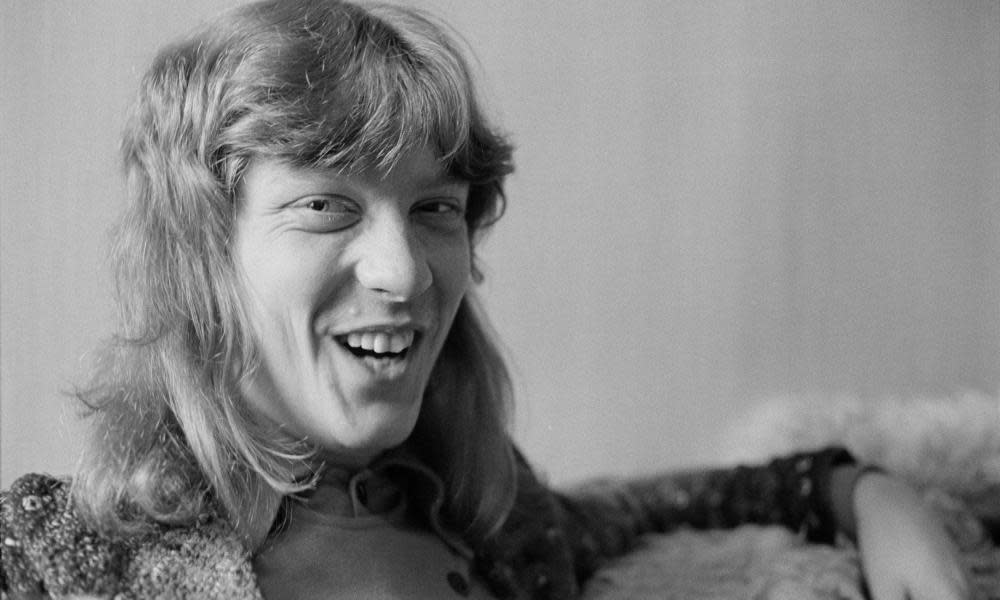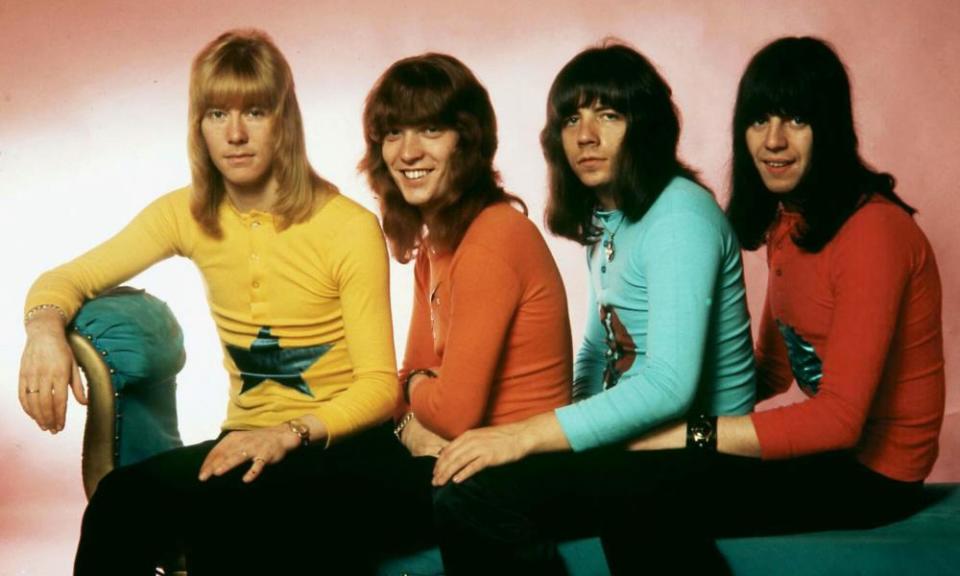Steve Priest: the outrageous Sweet bassist who presaged heavy metal

It’s not an exact science, but British glam rock can broadly be divided into two categories. There was what’s come to be known as “high glam”, the genre’s originators and most artful practitioners: Bowie and his acolytes, Roxy Music, T Rex – album artists who could expect serious critical consideration and the space in interviews to expound on their thoughts about the influence of literature, theatre and the visual arts on their work. And there was “low glam”: singles artists aimed squarely at the teenyboppers, critically reviled opportunists (as if anyone could reasonably be tarred with that brush in a world dominated by Marc Bolan and the former David Jones, who’d both spent the 60s desperately trying to become famous by any means necessary).
The musicians who had leapt on the gaudier aspects of Bolan and Bowie’s image and sound – the glitter, satin and tat; the crunching, distorted guitars – but were less inclined to publish books of poetry, or discuss Richard Hamilton, William Burroughs and Japanese kabuki theatre in front of journalists.
Related: The Sweet bassist Steve Priest dies aged 72
No band personified low glam like the Sweet. Between 1972 and 1975, they made what’s arguably glam’s greatest run of singles – Block Buster, Hell Raiser, The Ballroom Blitz, Teenage Rampage and Fox on the Run among them, records as viscerally thrilling and potent as the British charts have ever played host to – but they weren’t art-school aesthetes or sexually ambiguous students of mime. They were musical journeymen, who had already existed in two iterations before the top of the charts beckoned. First as psychedelic arrivistes, originally called the Sweetshop; then as purveyors of a British equivalent of US bubblegum, releasing well-crafted but featherweight novelty hits on which they didn’t actually play, leaving that to session musicians – the blatant Sugar Sugar knock-off Funny Funny; cod-Caribbean claptrap like Co-Co and Poppa Joe – before their sound unexpectedly toughened up, as a result of the band demanding to perform on their own records.
On the same edition of Top of the Pops that hosted Bowie’s legendary performance of Starman, the Sweet appeared playing Wig Wam Bam: more lyrical nonsense, but this time set to thumping drums, distorted guitar and stacked vocal harmonies, the three key components of their subsequent hits.

And no member of the Sweet embodied low glam like bassist Steve Priest. Almost every low glam band had a member whose lot it was to take the excesses of their look one step further – Slade’s self-styled “super-yob” Dave Hill; Mud’s Rob Davies, visibly uncomfortable in his dangly earrings and chiffon – but Priest entered into the role with astonishing gusto. He slathered himself in so much slap that, in Priest’s telling, Bowie himself felt impelled to intervene backstage at Top of the Pops – “He said, ‘You know you really are putting much too much makeup on?’” – and camped up his performances with a cartoonish relentlessness. In the 1974 TV documentary All That Glitters, Priest spots the camera as he exits a limousine and suddenly starts mincing, one hand on hip, wrists limp. The effect wasn’t androgynous so much as deeply disconcerting: Priest was, in writer Julie Burchill’s memorable assessment, “built like a hod-carrier” and looked “like a navvy who’d stolen all your makeup”.
His costumes, meanwhile, seemed to go beyond entertainment into a very proto-punk desire to shock: on the 1973 TOTP Christmas special, he mimed Block Buster dressed as, in his words, “a gay Nazi”, complete with swastika armband, uniform and full makeup: on another occasion, he took to the stage wearing a sequinned jumpsuit with the words “FUCK YOU” written on the back. “We’re a nasty group,” they were fond of telling journalists, mooting the unrealised idea for an album with the similarly punk-foreshadowing title We’re Revolting.
Priest’s onstage persona impacted not just on the way the Sweet looked but on how they sounded. Songwriters Mike Chapman and Nicky Chinn and producer Phil Wainman packed their singles with special effects – air-raid sirens, explosions, timpani, stamping feet, fans chanting “We want Sweet!” – but the most striking were Priest’s hysterical vocal interjections. The most famous is his cry of: “We just haven’t got a clue WHAT to do!” on Block Buster, which he invariably delivered to camera with a pout and one finger querulously placed against his chin, but all their hits had one. The verses of the impossibly exciting Hell Raiser are effectively a duet between frontman Brian Connolly and Priest in high-camp mode (“Oh mama you don’t UNDERSTAND … she took me COMPLETELY!”); Teenage Rampage, perhaps their greatest single, finds him musing delightedly on youth rebellion: “Imagine the formation of teenage legislation / at 13 they were fooling, at 16 they’ll be ruling.”
The results were extraordinary: hard rock with a relentless supply of pop hooks, the Sweet’s singles gleefully pummel the listener into submission. But there were problems. They wanted to be taken seriously as a rock band, a role for which they undoubtedly had the chops, as evidenced by the 1973 live recording of them playing London’s Rainbow released two years later as Strung Up: the audience are screaming teenagers, but the music is astonishingly raw, pitched somewhere between proto-punk and heavy metal. They could write album tracks and B-sides good enough to belie their image as puppets of the Chinnichap team – Set Me Free, Burning – but they were never quite the match of their hits, and their albums never sold in the same quantities as their singles.
Related: Sign up for the Sleeve Notes email: music news, bold reviews and unexpected extras
The band ceased working with Wainman, then their relationship with Chinn and Chapman was further strained further by the rise of Chinnichap’s latest protoges Mud, whose Tiger Feet – a song that could have been written for the Sweet – kept Teenage Rampage off the No 1 spot.
The band produced two flatly brilliant self-penned singles, Fox On the Run and Action, the latter a defiant proclamation of their new independence – “gonna bring you down ‘cause you’ve been pushing me, you’ve got to recognise my superiority” – but their decline was exacerbated by the damage to Connolly’s voice sustained in a street fight and his subsequent alcoholism.
Having presaged punk, they made the curious decision to become more musically sophisticated at its height, a move which yielded the impressive 1978 hit Love Is Like Oxygen and little else. Connolly left the following year, and the Sweet eventually split. Subsequent attempts to regroup their classic lineup failed: at one subsequent point, there were three different extant versions of the band, each containing one original member, Priest among them.
The Sweet never became the band they really wanted to be, but it didn’t matter: the band they had been was more than enough. Their singles still sound amazing nearly 50 years on; their TOTP appearances define both low glam and the era in which they thrived. By the time the Sweet’s ex-members were trudging round the oldies circuit, their wider impact had become obvious.
British punk was staffed largely by people who had grown up in front of the glam-era TOTP, underlined when the Damned covered Ballroom Blitz. Moreover, they were a huge influence on 80s metal: Axl Rose claimed they were his favourite band, Def Leppard covered Hell Raiser and Action, the nascent Mötley Crüe attempted to seek them out for career advice. You didn’t have to examine hair metal too hard to see the Sweet’s ghost, you just had to look at the photos: straight boys covered in makeup, possessed by a desire to shock, every one of them metaphorically Steve Priest’s offspring.

 Yahoo News
Yahoo News 
